How to run two apps at the same time on Xiaomi phone
How to run two applications on the same screen on Xiaomi phone
Follow the following steps to split screen on your Xiaomi phone
Please make sure your Xiaomi phone has been upgraded to the latest MIUI development version (Android 7.0) or the latest stable version of MIUI8 (Android 7.0). It should be noted that the stable version may not be able to implement the split-screen function of some software. There are certain risks in flashing the machine, so please consider it carefully.
After the system upgrade is completed, we need to enter the "Settings-More Settings" interface of the phone, and then click "Developer Options". In the Developer Options interface, we need to find and check the option "Force activities to be resizable". The function of this option is to force applications that do not support split-screen functionality to display in split-screen mode. With this setting, we can still use other applications at the same time when using applications that do not support split screen.
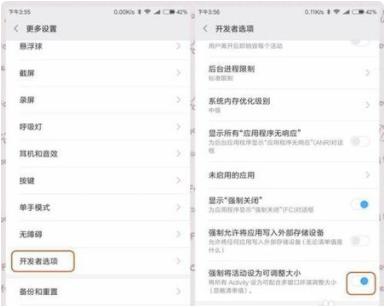
3. After opening it, you can install the APK plug-in, check I have read and agree, and click the Continue button below to enter the program.
In Android 7.0, Nougat parallel windows can support split-screen mode, so that two mirror windows of the same application can perform different operations in different parts. In this way, users can operate multiple windows on the mobile phone screen at the same time, eliminating the cumbersome steps of switching applications.
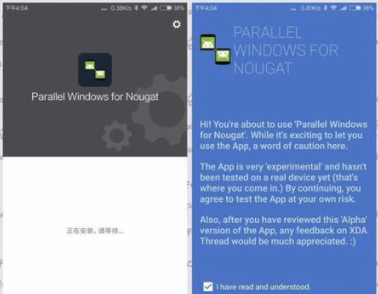
Click to enter the application interface and allow relevant permissions (such as turning on the lock screen display, displaying the floating window, and enabling accessibility services). It will not be possible if split screen is not enabled.
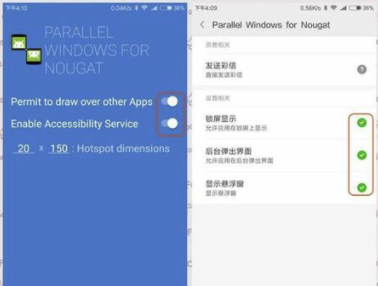
5. Accessibility settings: Click Settings-More Settings-Accessibility-Parallel Windows for Nougat-Turn on
Open the floating window: click the task key-slide down the Nougat parallel window-click application details-slide to the bottom-click permission management-display the floating window
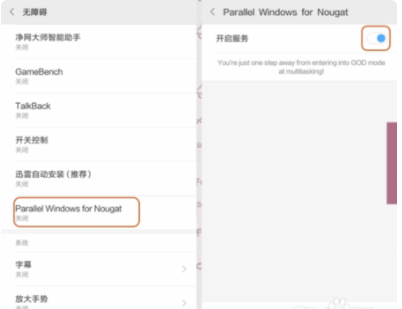
6. After simple settings, restart the phone. After restarting, enter the application to check whether the permissions are still there, and then return to the desktop to implement the split-screen function. In order to ensure that background tasks are not cleared, it is recommended to lock the background tasks first.
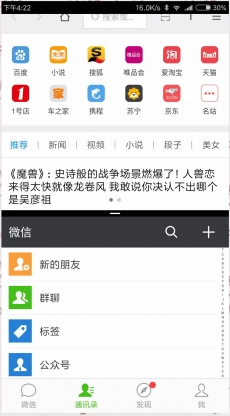
7. Open any application software, such as the browser that comes with your mobile phone. In the browser interface, drag out the toolbar in the middle of the rightmost corner of the screen (the position must be correct, and call out the sidebar drawer indicator of the application) , a large number of people don’t know how to continue the operation after installation. If they can’t slide out once, they slide it several times.), click the second icon "=" split screen button, the toolbar will rebound and the current interface will be removed from the screen. Drag the bottom up to reduce the size of the current application window to half from the bottom up. At this time, the upper and lower windows are simultaneously used to realize the split-screen function.
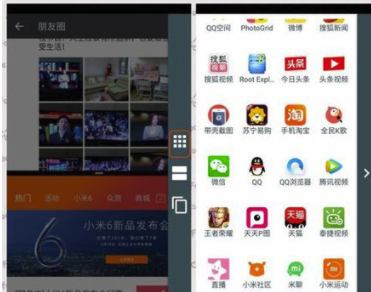
Note: Flashing is risky, please operate with caution.
What method can be used to open two or more programs by clicking on one icon?
It’s easy, just find a bundled software. However, some bundled software on the Internet will prompt that there is a virus after being bundled. You can use the one that comes with Windows:
Start-Run-iexpress-Next-Next-Enter a name-Next-Next-add-Select A.exe and B.exe-Next-Select A.exe for the one above and the one below And B.exe-next-hidden-next-browser (enter the bundled name), then click "Hide File...",-next-select no restart-next-select don't save-next One step - next - done.
Then when you run the exe file you saved, B.exe will also run after running A.exe, but it will run B after running A. You can also set it to run B before running A. In this step Settings: "Select A.exe and B.exe for the upper and lower ones respectively"
Batch processing can also be done: create 0.bat, edit - enter
echo off
a.exe
b.exe
exit
Then save and put a.exe, b.exe, and 0.bat in the same folder.
You can also use VB:2 shell commands.
The above is the detailed content of How to run two apps at the same time on Xiaomi phone. For more information, please follow other related articles on the PHP Chinese website!

Hot AI Tools

Undresser.AI Undress
AI-powered app for creating realistic nude photos

AI Clothes Remover
Online AI tool for removing clothes from photos.

Undress AI Tool
Undress images for free

Clothoff.io
AI clothes remover

Video Face Swap
Swap faces in any video effortlessly with our completely free AI face swap tool!

Hot Article

Hot Tools

Notepad++7.3.1
Easy-to-use and free code editor

SublimeText3 Chinese version
Chinese version, very easy to use

Zend Studio 13.0.1
Powerful PHP integrated development environment

Dreamweaver CS6
Visual web development tools

SublimeText3 Mac version
God-level code editing software (SublimeText3)

Hot Topics
 1386
1386
 52
52
 Discover How to Fix Drive Health Warning in Windows Settings
Mar 19, 2025 am 11:10 AM
Discover How to Fix Drive Health Warning in Windows Settings
Mar 19, 2025 am 11:10 AM
What does the drive health warning in Windows Settings mean and what should you do when you receive the disk warning? Read this php.cn tutorial to get step-by-step instructions to cope with this situation.
 How do I edit the Registry? (Warning: Use with caution!)
Mar 21, 2025 pm 07:46 PM
How do I edit the Registry? (Warning: Use with caution!)
Mar 21, 2025 pm 07:46 PM
Article discusses editing Windows Registry, precautions, backup methods, and potential issues from incorrect edits. Main issue: risks of system instability and data loss from improper changes.
 How do I manage services in Windows?
Mar 21, 2025 pm 07:52 PM
How do I manage services in Windows?
Mar 21, 2025 pm 07:52 PM
Article discusses managing Windows services for system health, including starting, stopping, restarting services, and best practices for stability.
 How to Fix the Steam Cloud Error? Try These Methods
Apr 04, 2025 am 01:51 AM
How to Fix the Steam Cloud Error? Try These Methods
Apr 04, 2025 am 01:51 AM
The Steam Cloud error can be caused by many reasons. To play a game smoothly, you need to take some measures to remove this error before you launch the game. php.cn Software introduces some best ways as well as more useful information in this post.
 Windows Metadata and Internet Services Problem: How to Fix It?
Apr 02, 2025 pm 03:57 PM
Windows Metadata and Internet Services Problem: How to Fix It?
Apr 02, 2025 pm 03:57 PM
You may see the “A connection to the Windows Metadata and Internet Services (WMIS) could not be established.” error on Event Viewer. This post from php.cn introduces how to remove the Windows Metadata and Internet Services problem.
 How do I change the default app for a file type?
Mar 21, 2025 pm 07:48 PM
How do I change the default app for a file type?
Mar 21, 2025 pm 07:48 PM
Article discusses changing default apps for file types on Windows, including reverting and bulk changes. Main issue: no built-in bulk change option.
 How to Resolve the KB5035942 Update Issues – Crashing System
Apr 02, 2025 pm 04:16 PM
How to Resolve the KB5035942 Update Issues – Crashing System
Apr 02, 2025 pm 04:16 PM
KB5035942 update issues - crashing system commonly happens to users. Inflicted people hope to find a way out of the kind of trouble, such as crashing system, installation, or sound issues. Targeting these situations, this post published by php.cn wil
 How do I use the Group Policy Editor (gpedit.msc)?
Mar 21, 2025 pm 07:48 PM
How do I use the Group Policy Editor (gpedit.msc)?
Mar 21, 2025 pm 07:48 PM
The article explains how to use the Group Policy Editor (gpedit.msc) in Windows for managing system settings, highlighting common configurations and troubleshooting methods. It notes that gpedit.msc is unavailable in Windows Home editions, suggesting




